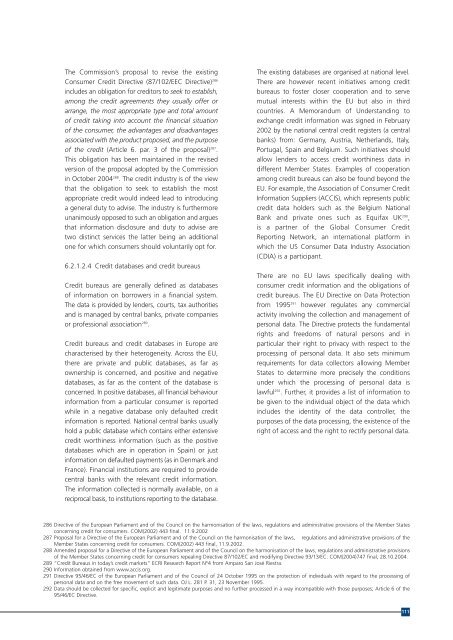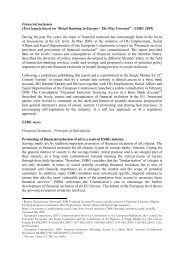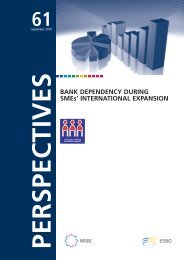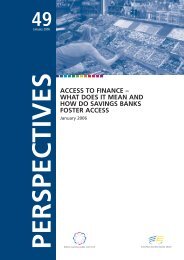A comparative analysis of the US and EU retail banking markets - Wsbi
A comparative analysis of the US and EU retail banking markets - Wsbi
A comparative analysis of the US and EU retail banking markets - Wsbi
Create successful ePaper yourself
Turn your PDF publications into a flip-book with our unique Google optimized e-Paper software.
The Commission’s proposal to revise <strong>the</strong> existing<br />
Consumer Credit Directive (87/102/EEC Directive) 286<br />
includes an obligation for creditors to seek to establish,<br />
among <strong>the</strong> credit agreements <strong>the</strong>y usually <strong>of</strong>fer or<br />
arrange, <strong>the</strong> most appropriate type <strong>and</strong> total amount<br />
<strong>of</strong> credit taking into account <strong>the</strong> financial situation<br />
<strong>of</strong> <strong>the</strong> consumer, <strong>the</strong> advantages <strong>and</strong> disadvantages<br />
associated with <strong>the</strong> product proposed, <strong>and</strong> <strong>the</strong> purpose<br />
<strong>of</strong> <strong>the</strong> credit (Article 6. par. 3 <strong>of</strong> <strong>the</strong> proposal) 287 .<br />
This obligation has been maintained in <strong>the</strong> revised<br />
version <strong>of</strong> <strong>the</strong> proposal adopted by <strong>the</strong> Commission<br />
in October 2004 288 . The credit industry is <strong>of</strong> <strong>the</strong> view<br />
that <strong>the</strong> obligation to seek to establish <strong>the</strong> most<br />
appropriate credit would indeed lead to introducing<br />
a general duty to advise. The industry is fur<strong>the</strong>rmore<br />
unanimously opposed to such an obligation <strong>and</strong> argues<br />
that information disclosure <strong>and</strong> duty to advise are<br />
two distinct services <strong>the</strong> latter being an additional<br />
one for which consumers should voluntarily opt for.<br />
6.2.1.2.4 Credit databases <strong>and</strong> credit bureaus<br />
Credit bureaus are generally defined as databases<br />
<strong>of</strong> information on borrowers in a financial system.<br />
The data is provided by lenders, courts, tax authorities<br />
<strong>and</strong> is managed by central banks, private companies<br />
or pr<strong>of</strong>essional association 289 .<br />
Credit bureaus <strong>and</strong> credit databases in Europe are<br />
characterised by <strong>the</strong>ir heterogeneity. Across <strong>the</strong> <strong>EU</strong>,<br />
<strong>the</strong>re are private <strong>and</strong> public databases, as far as<br />
ownership is concerned, <strong>and</strong> positive <strong>and</strong> negative<br />
databases, as far as <strong>the</strong> content <strong>of</strong> <strong>the</strong> database is<br />
concerned. In positive databases, all financial behaviour<br />
information from a particular consumer is reported<br />
while in a negative database only defaulted credit<br />
information is reported. National central banks usually<br />
hold a public database which contains ei<strong>the</strong>r extensive<br />
credit worthiness information (such as <strong>the</strong> positive<br />
databases which are in operation in Spain) or just<br />
information on defaulted payments (as in Denmark <strong>and</strong><br />
France). Financial institutions are required to provide<br />
central banks with <strong>the</strong> relevant credit information.<br />
The information collected is normally available, on a<br />
reciprocal basis, to institutions reporting to <strong>the</strong> database.<br />
The existing databases are organised at national level.<br />
There are however recent initiatives among credit<br />
bureaus to foster closer cooperation <strong>and</strong> to serve<br />
mutual interests within <strong>the</strong> <strong>EU</strong> but also in third<br />
countries. A Memor<strong>and</strong>um <strong>of</strong> Underst<strong>and</strong>ing to<br />
exchange credit information was signed in February<br />
2002 by <strong>the</strong> national central credit registers (a central<br />
banks) from: Germany, Austria, Ne<strong>the</strong>rl<strong>and</strong>s, Italy,<br />
Portugal, Spain <strong>and</strong> Belgium. Such initiatives should<br />
allow lenders to access credit worthiness data in<br />
different Member States. Examples <strong>of</strong> cooperation<br />
among credit bureaus can also be found beyond <strong>the</strong><br />
<strong>EU</strong>. For example, <strong>the</strong> Association <strong>of</strong> Consumer Credit<br />
Information Suppliers (ACCIS), which represents public<br />
credit data holders such as <strong>the</strong> Belgium National<br />
Bank <strong>and</strong> private ones such as Equifax UK 290 ,<br />
is a partner <strong>of</strong> <strong>the</strong> Global Consumer Credit<br />
Reporting Network, an international platform in<br />
which <strong>the</strong> <strong>US</strong> Consumer Data Industry Association<br />
(CDIA) is a participant.<br />
There are no <strong>EU</strong> laws specifically dealing with<br />
consumer credit information <strong>and</strong> <strong>the</strong> obligations <strong>of</strong><br />
credit bureaus. The <strong>EU</strong> Directive on Data Protection<br />
from 1995 291 however regulates any commercial<br />
activity involving <strong>the</strong> collection <strong>and</strong> management <strong>of</strong><br />
personal data. The Directive protects <strong>the</strong> fundamental<br />
rights <strong>and</strong> freedoms <strong>of</strong> natural persons <strong>and</strong> in<br />
particular <strong>the</strong>ir right to privacy with respect to <strong>the</strong><br />
processing <strong>of</strong> personal data. It also sets minimum<br />
requirements for data collectors allowing Member<br />
States to determine more precisely <strong>the</strong> conditions<br />
under which <strong>the</strong> processing <strong>of</strong> personal data is<br />
lawful 292 . Fur<strong>the</strong>r, it provides a list <strong>of</strong> information to<br />
be given to <strong>the</strong> individual object <strong>of</strong> <strong>the</strong> data which<br />
includes <strong>the</strong> identity <strong>of</strong> <strong>the</strong> data controller, <strong>the</strong><br />
purposes <strong>of</strong> <strong>the</strong> data processing, <strong>the</strong> existence <strong>of</strong> <strong>the</strong><br />
right <strong>of</strong> access <strong>and</strong> <strong>the</strong> right to rectify personal data.<br />
286 Directive <strong>of</strong> <strong>the</strong> European Parliament <strong>and</strong> <strong>of</strong> <strong>the</strong> Council on <strong>the</strong> harmonisation <strong>of</strong> <strong>the</strong> laws, regulations <strong>and</strong> administrative provisions <strong>of</strong> <strong>the</strong> Member States<br />
concerning credit for consumers. COM(2002) 443 final. 11.9.2002<br />
287 Proposal for a Directive <strong>of</strong> <strong>the</strong> European Parliament <strong>and</strong> <strong>of</strong> <strong>the</strong> Council on <strong>the</strong> harmonisation <strong>of</strong> <strong>the</strong> laws, regulations <strong>and</strong> administrative provisions <strong>of</strong> <strong>the</strong><br />
Member States concerning credit for consumers. COM(2002) 443 final, 11.9.2002.<br />
288 Amended proposal for a Directive <strong>of</strong> <strong>the</strong> European Parliament <strong>and</strong> <strong>of</strong> <strong>the</strong> Council on <strong>the</strong> harmonisation <strong>of</strong> <strong>the</strong> laws, regulations <strong>and</strong> administrative provisions<br />
<strong>of</strong> <strong>the</strong> Member States concerning credit for consumers repealing Directive 87/102/EC <strong>and</strong> modifying Directive 93/13/EC. COM(2004)747 final, 28.10.2004.<br />
289 “Credit Bureaus in today’s credit <strong>markets</strong>” ECRI Research Report N°4 from Amparo San José Riestra.<br />
290 Information obtained from www.accis.org.<br />
291 Directive 95/46/EC <strong>of</strong> <strong>the</strong> European Parliament <strong>and</strong> <strong>of</strong> <strong>the</strong> Council <strong>of</strong> 24 October 1995 on <strong>the</strong> protection <strong>of</strong> individuals with regard to <strong>the</strong> processing <strong>of</strong><br />
personal data <strong>and</strong> on <strong>the</strong> free movement <strong>of</strong> such data. OJ L. 281 P. 31, 23 November 1995.<br />
292 Data should be collected for specific, explicit <strong>and</strong> legitimate purposes <strong>and</strong> no fur<strong>the</strong>r processed in a way incompatible with those purposes; Article 6 <strong>of</strong> <strong>the</strong><br />
95/46/EC Directive.<br />
111
















